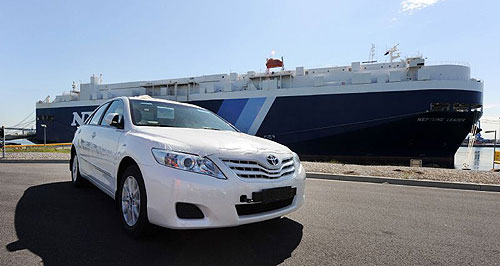Make / Model Search
News - General News - RegulationJapanese cars to be tested for radiation at Port KemblaDouble check: A shipment of cars landing at Port Kembla via Japan will be screened for radiation. Nuclear watchdog ARPANSA to screen boatload of cars for contamination at NSW port22 Jun 2011 A SHIPMENT of Japanese cars will be screened for radiation by Australia’s nuclear watchdog when they arrive at Port Kembla, south of Sydney later this week. The Australian Radiation Protection and Nuclear Safety Agency (ARPANSA) has agreed to test a shipment of around 800 cars from several different manufacturers before they are offloaded. The ship in question, named Trans Future 7, will land at the Port Kembla dock after coming via the Japanese port of Yokohama. The move comes after a push from the Maritime Union of Australia (MUA), which has been urging this type of screening on Japanese imports since the March 11 tsunami and subsequent nuclear leakage from the Fukushima Dai-ichi plant. "This is a win for workers, and also a win for the Australian public," said Assistant National Secretary Warren Smith. "Any risk of radiation is too big a risk to take. Workers and consumers come into direct contact with these cars - the Government watchdog must ensure there is no health and safety risk. "The Australian public has a right to know if there is a radiation threat."While many of the major Japanese importers bring cars to Australia via the Yokohama port, most of the cars on Trans Future 7 are from the Toyota stable. Toyota Australia manager of public affairs and communication, Glenn Campbell confirmed to GoAuto that among those cars on board Trans Future 7 were 646 new Toyotas and 55 new Lexus vehicles, as well as 20 used vehicles of undetermined make. Acting chief executive of ARPANSA, Professor Peter Johnson, told the ABC that the organisation did not expect to find harmful levels of radiation. "We do expect to see radiation and we do expect to see radioactivity,” he said. “We do not expect to see any radioactive contamination which is of concern to public health.” In May, customs agents in Chile found small levels of radiation on 21 cars exported via the Yokohama port, although the contamination levels were too low to pose any risk to human health. The Japanese Automobile Manufacturers Association (JAMA) has been testing the radiation levels of vehicle exports since April. “JAMA is fully confident in the safety of all motor vehicles manufactured in Japan,” it said in a statement. “At the same time, it is aware of the need for consumers everywhere to be assured of such safety. “For that reason, JAMA has initiated its own procedures to test the radiation levels of vehicles produced in Japan, having enlisted the expertise of an external authority specialising in the field.” It went on to say that radiation levels around the production bases and ports of shipment of JAMA members – which include most of the big Japanese exporters – had been significantly lower than the maximum allowable limit recommended by the International Atomic Energy Agency (IAEA) since March 25. “In view of these findings”, it said, “JAMA is entirely confident that the motor vehicles now being manufactured by its member automakers in Japan present no cause for concern to consumers, whether overseas or in Japan.”  Read more |
Click to shareGeneral News articlesResearch General News Motor industry news |











Facebook Twitter Instagram